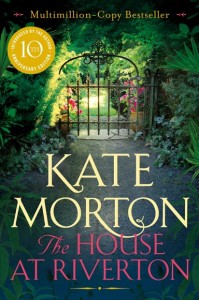INTERVIEW: Kate Morton in Conversation with Suffolk Libraries
This interview was recorded in May 2021, when Riverton was chosen as Book of the Month by the DiscoveReads Book Group. Kate Morton spoke with Lisa Brennan, Reader Development Librarian at Suffolk Libraries about how it felt to be published for the first time, writing the manuscript that would become The Shifting Fog, and how Fog became Riverton. The conversation also covers other books, and the writing process generally.
IDEAS: Three central threads
The House in Decline
I love stories in which the house is more than a setting, becoming a character in its own right. In writing my own English country house mystery, I was keen to play with the conventions of the genre a little. That’s why I made Marcus a mystery writer, and gave Grace a penchant for mystery novels, in particular those by Agatha Christie: the quintessential English country house mystery novelist! It was a lot of fun to have Agatha Christie come to dinner in my story. I was inspired also by English country house non-fiction: in particular, I went through a great fascination with the Mitford sisters. Everything I read about the Mitford family seemed brighter than fiction. I was especially interested in the depiction of a great aristocratic family on the verge of decline. Their genteel poverty was a revelation to me and something I was very keen to incorporate into my story, and my depiction of the house at Riverton.
The Character of Grace
The character of ninety-eight-year-old Grace came to me fully formed. She was real to me from the beginning and I missed her incredibly when I finished writing. Though she isn’t based on any one person, I’m lucky to have lots of friends who are much older than I am, who I could talk to, and from whom I could draw traits for Grace. I got the idea for Grace’s taped letters to Marcus from my dear friend Herbert Davies whose writing is so completely indecipherable—sorry, Herbert, but it is! — that he sends letters to family in the UK on tapes. I was also fortunate to spend a lot of time with my Nana Connelly (whose talent for shorthand inspired part of the story) and my husband’s Little Nanny in the final years of their lives. I noticed how invisible the elderly sometimes become, and was constantly amazed at the way people with such great wisdom and experience, who have loved and lost and lived such a long time, are so often infantilised and dismissed in our society.
The End of the Edwardian Era
I am fascinated by the period in English history, when nineteenth century gave way to twentieth, and the world as we now know it began to take shape. Queen Victoria died, and with her, old certainties were consigned to the grave: the aristocratic system began to crumble, the cash-strapped gentry was displaced by a new type of upper class made powerful by money rather than by birth, humanity suffered battle on a scale undreamt of, and women were freed somewhat from rigid pre-existing expectations of social function. What would happen, I wondered, if two sisters were born to such a crucial time, the elder falling victim to certain of society’s demands, the other, just a few years younger, escaping them? And what might happen if each sister hankered after a privilege she perceived in the other’s life? What sort of envies might such differences provoke? And what might happen to their sibling loyalties if I threw in a man perceived by each sister as a means of escape?
Kate Morton, 2006








